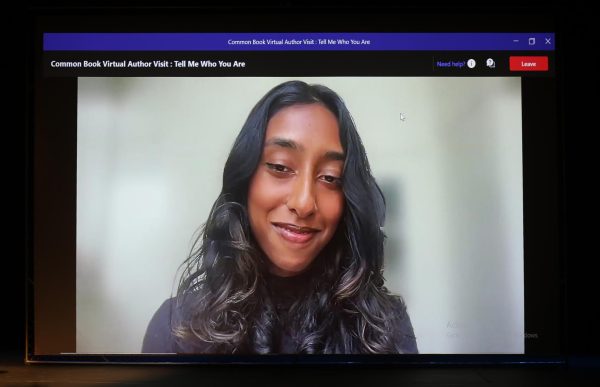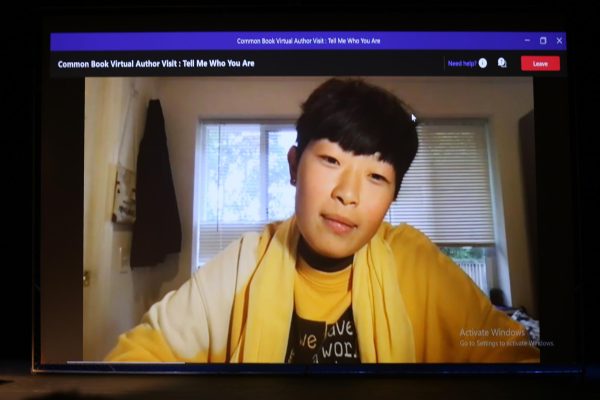

Brookhaven Campus hosted a virtual Q&A with Winona Guo and Priya Vulchi, authors of the Dallas College Commons Book “Tell Me Who You Are: Sharing Our Stories of Race, Culture & Identity.” On Nov. 16, Brookhaven students, staff and faculty gathered in the Performance Hall to hear Guo anvd Vulchi speak via a Microsoft Teams meeting broadcast on a screen. The Q&A was also live-streamed at every other Dallas College campus.
The Q&A, as well as the Dallas College Common Experience, which the Common Book program is a part of, were overseen by Toniette Robinson, associate dean of special academic programs at Brookhaven. Robinson, present via Teams, opened the session. Robinson said, “I believe that a lot of the students are able to read this book and see themselves or learn something about other peoples’ cultures.”
Robinson then began the Q&A with Guo and Vulchi. Vulchi opened by giving some context to the creation of their book. She said while she and Guo were in high school they noticed a pattern with their teachers and curriculums. At the time, a viral picture was circling the internet and social media. The picture was of a dress some people saw as black with blue stripes while others saw white and gold stripes. Vulchi said, “It went viral, and we went to class the next day and all of our teachers were also talking about it.”
Guo said she and Vulchi were surprised their teachers could make time to talk about this viral sensation in class, considering their teachers did not make time for other subjects such as discrimination, police brutality and ongoing liberation efforts. All of these, in Guo and Vulchi’s eyes, were significant issues greatly affecting students’ lives.
Guo said, “We realized then in our sophomore year that we had not really questioned what we were learning in school or why we were learning it.”
This experience as well as other similar incidents inspired Guo and Vulchi to write their own curriculums. Vulchi said she and Guo wrote their ideas on whiteboards and blackboards in Vulchi’s childhood bedroom.
Vulchi said, “We were realizing that schools were microcosms of society, so what we learn and who we are within those walls has consequences far beyond our immediate campuses.”
Guo and Vulchi decided they wished to determine what they needed to learn. Vulchi said she and Guo started asking themselves questions such as, “What if we saw ourselves not as passive recipients of information within our schools, but rather as agents ourselves?”
One of the primary topics Guo and Vulchi wished to cover was racial literacy. Guo said, “Race has always impacted every part of our lives and our racially divided communities, from our neighborhoods to our friend groups to our lunch tables to our classrooms.” Guo and Vulchi wanted to highlight the ways in which race is tightly wound into society.
Guo and Vulchi were met with pushback and indifference from authority figures. Guo said, “We were told over and over again that we were ‘creating a problem where none existed.’”
Guo and Vulchi wrote a K-12 textbook on racial literacy called “The Classroom Index.” They also founded the nonprofit Choose, which is dedicated to teaching racial literacy, in 2014. The book is now sold out and in 2016 was recognized by Princeton University in its Princeton Prize in Race Relations award, as well as The Harnisch Foundation and the Not in Our Town’s Unity award, according to Choose’s website.
The two authors continued their efforts by starting to write a new book, which would eventually come to be “Tell Me Who You Are.” This started with Guo and Vulchi interviewing individuals in the local area. Vulchi said, “Every day after school, we would go downtown to tap strangers on the shoulder and say, ‘Hey, how has race impacted your life?’”
After this, Guo and Vulchi set a goal for themselves: They would travel across every state in the country, interviewing anyone who was willing to talk about race and its impact.
A week after graduating from high school, Guo and Vulchi left for their first state, Alaska. By the same time next year, they had achieved their goal, interviewing over 200 people across the U.S. Vulchi said about 90%of the people she and Guo talked to had deeply personal stories about how race had impacted their lives.
Guo said in the midst of their interviews, she and Vulchi realized they were missing something in their writing: statistics and context.
“We started adding statistics and sociological research to place each story in a larger systematic context,” Guo said. “For instance, if we interviewed someone who shared an experience with police brutality, we would then pair that story to sociological research to explain how that experience with police brutality was not just one isolated incident, but rather a systemic issue in this country.” Guo and Vulchi dubbed this mixture of personal experience and statistical systems the Heart-Mind Map of Racial Literacy.
Guo and Vulchi said they learned an immeasurable amount of things during their trip. Vulchi said, “People all around us have aspirations to share. All we have to do is listen.”






